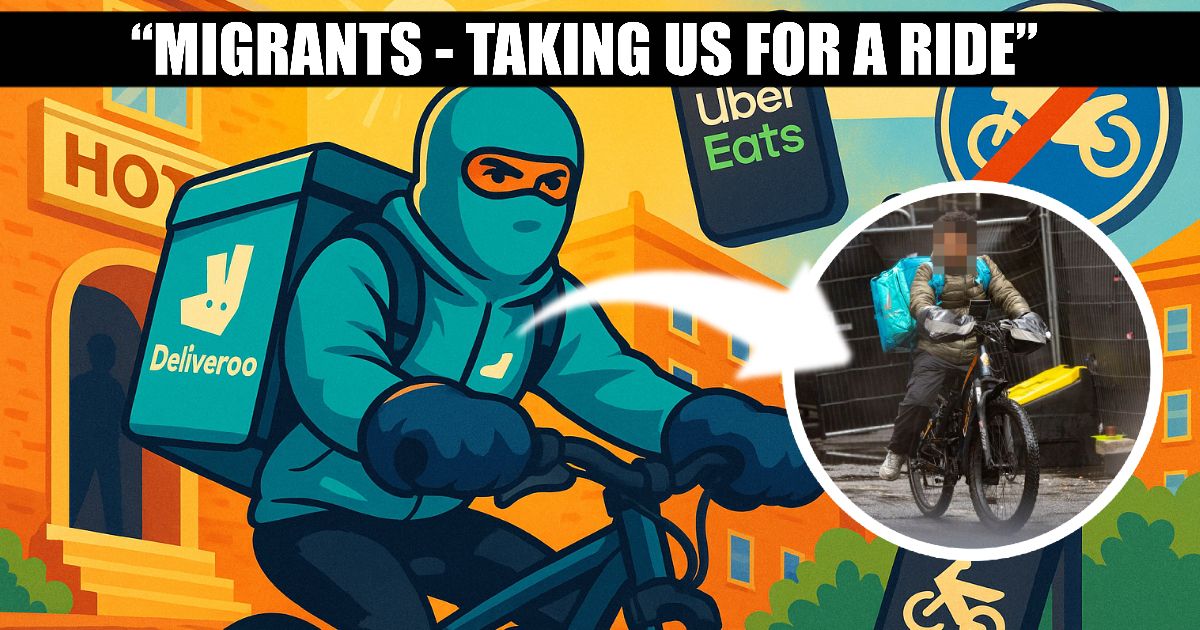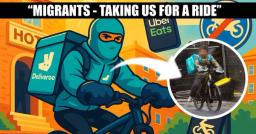Immigrants - Taking us for a Ride
EXCLUSIVE: Migrants banned from working found delivering food on illegal e-bikes using rented app logins—underground network thrives in plain sight across UK.
In a Britain where the rules are rigid, the punishments are precise, and the public is routinely reminded that immigration laws are not so much guidelines as gospel, one might be surprised to discover a parallel delivery economy operating with all the elegance of a banana republic.
Within hours of stepping off a dinghy in Dover, a growing number of small boat migrants—some still dripping wet—have reportedly found themselves gainfully employed delivering kebabs and curry boxes to doorsteps across the capital. This, despite the small print on their immigration paperwork that reads, in effect: “Do not pass Go, do not collect £500 a week.”
The law is clear. Crystal, in fact. Asylum seekers in the United Kingdom are prohibited from working while their claims are under review, unless they have been waiting more than twelve months and have been granted special permission to work in a very narrow list of shortage occupations. “Deliveroo driver” does not feature. Nor does “Just Eat cyclist” or “Uber Eats throttle jockey.” And yet, outside taxpayer-funded hotels in London, Bournemouth, and Birmingham, the high-vis jackets, branded thermal bags, and industrial-strength e-bikes tell a very different story.
From those hotels—funded by the Home Office, furnished by the taxpayer, and festooned with polite little notices reminding guests not to get any ideas about earning money—emerges a new class of courier. They are fast. They are invisible to enforcement. And they are all, without exception, illegal.
The method is deceptively simple. Gig economy accounts—Uber Eats, Just Eat, Deliveroo—are created by legitimate users, often British citizens or foreign nationals with the correct documentation. Those accounts are then quietly rented out, often through Facebook groups with tens of thousands of members, to individuals who have no legal right to work in the UK, let alone tear through traffic on a modified electric moped with no insurance, no training, and no fear of being stopped.
The cost of such access? Around £50 to £70 per week. The return? Up to £500.00 per week in untraceable cash, tax-free and undetected. Everyone gets what they want. The apps get their deliveries done. The migrants get a pay day. The account holder gets a tidy passive income stream. And the public gets a steaming lamb biryani delivered by a man who shouldn’t be in the country, shouldn’t be working, and is riding a throttled death trap that technically qualifies as an unregistered moped.
The machines are key. Under British law, an electric bike is only road-legal if it provides pedal assistance, does not exceed 250 watts of motor power, and cuts out at 15.5 miles per hour. What we’ve seen outside asylum hotels is rather different. These are not bikes.
They are technically illegal mopeds—customised, turbo-charged, throttle-operated, and entirely pedal-optional. Many of them are home-made, some are imported but are not legal on the UK’s roads, and all are utterly beyond the reach of DVLA registration or Metropolitan Police concern.
These throttled mopeds can reach speeds of 30 miles per hour and beyond, giving their riders a significant edge over their law-abiding competitors. And in the twisted logic of the gig economy, speed is everything.
The faster your delivery, the more jobs you’re offered. The more jobs you accept, the more the algorithm smiles upon you. And the more throttle-only mopeds you have on your platform, the faster your entire delivery network becomes. Quite by accident, the gig economy has engineered an arms race in which the only way to survive is to break the law faster than your competitors.
Inside the hotels—where residents are legally barred from working—gig economy platforms have placed official printed notices urging riders not to use unregulated or unsafe e-bikes. The logic of that is difficult to unpack. If nobody in the building is legally permitted to work, one might reasonably ask what purpose these posters serve. It would appear, based on mounting video and photographic evidence, that Uber Eats, Deliveroo, and Just Eats are not only aware that asylum hotels are being used as dispatch hubs—they have gone to the trouble of posting safety guidance inside them. One could almost applaud the efficiency.
The result is a kind of parallel economy. An underground labour market where no one pays tax, no one has insurance, and no one is accountable. The gig apps claim to be improving enforcement and tightening ID controls, but the reality on the ground tells a different story. All they’ve really done is shift responsibility. You break the law, you take the risk. You crash the bike, it’s on you. You die in traffic, tough luck. But the app keeps running. The delivery gets made. And nobody in ycorporate HQ has to explain themselves to a Select Committee.
There is a solution to all this, of course. It is neither complicated nor expensive. A dedicated city police unit, tasked with identifying, stopping, seizing and destroying illegal delivery bikes on sight, could bring this black market crashing down in a matter of months. Illegal e-bike? Destroy it. No insurance? Confiscate it. Riding a moped disguised as a bicycle with no licence or documents? Remove it from the road and follow up with immigration enforcement. It would be fast. It would be effective. And it would be completely legal.
But politically, it’s unthinkable. Because when you remove the bikes, you remove the income. And when you remove the income, you create a new problem. Thousands of idle, disenfranchised, and increasingly frustrated young men—many of whom were never legally entitled to be here in the first place—now stranded in city centres with no money, nothing to do, and nowhere to go.
The government fears that more than it fears the growing illegality of the system. And so, nothing happens. The deliveries continue. The mopeds multiply. The algorithms tighten. And the public pays twice—once for the hotel, and again for the takeaway.
Well, that’s all for now. But until our next article, please stay tuned, stay informed, but most of all stay safe, and I’ll see you then.




